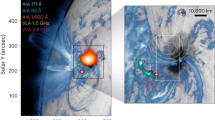Play all audios:

ABSTRACT RECENT rocket and satellite observations of 10–100 keV X-ray emission, together with ground-based observations of cm wavelength bursts, have thrown much light on the electromagnetic
emission of solar flares. It is widely believed that cm wavelength emission from flares is through synchrotron radiation, while the X-ray emission is from bremsstrahlung. The correlation
between the two regions of the electromagnetic spectrum has been studied in detail by Arnoldy _et al._1. It has been shown that the X-ray and the centimetric bursts are best correlated for
the first events in a flare; for subsequent events they are not well correlated. This type of correlation between the two phenomena can be understood if both emissions are assumed to come
from a common source. This leads to various difficulties. The alternative is that the radio and the X-ray emission come through the same energetic electrons from different layers of the
solar atmosphere. But, considering the various mechanisms proposed so far to explain the emissions, the problem of correlating the two remains unresolved. We therefore propose alternative
mechanisms to explain this correlation. Access through your institution Buy or subscribe This is a preview of subscription content, access via your institution ACCESS OPTIONS Access through
your institution Subscribe to this journal Receive 51 print issues and online access $199.00 per year only $3.90 per issue Learn more Buy this article * Purchase on SpringerLink * Instant
access to full article PDF Buy now Prices may be subject to local taxes which are calculated during checkout ADDITIONAL ACCESS OPTIONS: * Log in * Learn about institutional subscriptions *
Read our FAQs * Contact customer support SIMILAR CONTENT BEING VIEWED BY OTHERS DETECTION OF LONG-LASTING AURORA-LIKE RADIO EMISSION ABOVE A SUNSPOT Article 13 November 2023 SOLAR FLARE
ACCELERATES NEARLY ALL ELECTRONS IN A LARGE CORONAL VOLUME Article Open access 08 June 2022 GAMMA-RAY FLARES FROM RELATIVISTIC MAGNETIC RECONNECTION IN THE JET OF THE QUASAR 3C 279 Article
Open access 21 August 2020 REFERENCES * Arnoldy, R. L., Kane, S. R., and Winckler, J. R., _Tech. Rep._ _CR_-107 (Univ. Minnesota, 1967). * Petschek, H. E., _Avco Everett Rep._ (1964). *
Alfvén, H., and Carlquist, P., _Solar Phys._, 1, 220 (1967). Article ADS Google Scholar * Syrovatskü, S. I., _Sov. Astron. AJ_, 10, 270 (1966). ADS Google Scholar * Ginzburg, V. L., and
Ozernoy, L. M., _Ap. J._, 144, 599 (1966). Article ADS Google Scholar * Bruce, C. E. R., _Observatory_, 86, 83 (1966). ADS Google Scholar * Felton, J. E., and Morrison, P., _Ap. J._,
146, 686 (1966). Article ADS Google Scholar * Neuport, W. N., Gates, W., Swartz, M., and Young, R., _Ap. J._, 149, L79 (1966). Article ADS Google Scholar Download references AUTHOR
INFORMATION AUTHORS AND AFFILIATIONS * Centre for Advanced Study in Physics, University of Delhi, India J. N. TANDON & S. D. DESHPANDE * ARSD College, New Delhi, 23, India V. B. BHATIA
Authors * J. N. TANDON View author publications You can also search for this author inPubMed Google Scholar * S. D. DESHPANDE View author publications You can also search for this author
inPubMed Google Scholar * V. B. BHATIA View author publications You can also search for this author inPubMed Google Scholar RIGHTS AND PERMISSIONS Reprints and permissions ABOUT THIS ARTICLE
CITE THIS ARTICLE TANDON, J., DESHPANDE, S. & BHATIA, V. Electromagnetic Radiation from Solar Flares. _Nature_ 220, 1213–1214 (1968). https://doi.org/10.1038/2201213a0 Download citation
* Received: 14 October 1968 * Issue Date: 21 December 1968 * DOI: https://doi.org/10.1038/2201213a0 SHARE THIS ARTICLE Anyone you share the following link with will be able to read this
content: Get shareable link Sorry, a shareable link is not currently available for this article. Copy to clipboard Provided by the Springer Nature SharedIt content-sharing initiative
